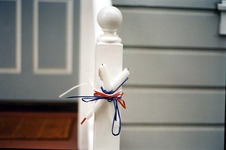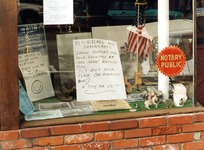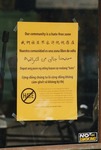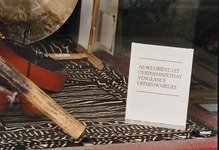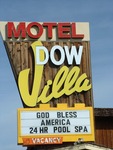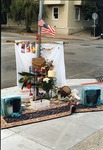 |
| Angelika/Mike Schilli |
Dear newsletter friends! Regarding the attacks on New York and Washington, you have already learned about them from the media. Many of you have asked us how the whole situation is being experienced in America. Therefore, Angelika has gathered some thoughts:
Angelika San Francisco on September 11, 2001: Everything can change in minutes. This wisdom has been heard many times before. Then suddenly it comes true. Just moments ago, lying deep in slumber in bed. It was supposed to be a completely normal day: darkroom, laundromat, errands ... but early in the morning, we are surprised by a "Breaking News" from New York.
Television images like something out of a science fiction film. A commercial airliner crashes directly into one of the towers of the World Trade Center. At first, I think: a terrible accident. But minutes later: a second plane appears out of nowhere and explosively hits the second tower of the World Trade Center. Black clouds of smoke everywhere. Utterly desperate people are jumping to their deaths from the upper floors to escape the spreading fire. The news is overwhelming. The Pentagon, the American Department of Defense, is also hit by a crashing commercial airliner.
Those were clearly terrorists, they hijacked American commercial airplanes filled with passengers from the airlines American and United Airlines and used the planes in the most perfidious way as bombs. The American aviation security authority has stopped air traffic across the entire USA and has closed all airports until further notice. There is no escape. Even if we wanted to, we could not leave the country at the moment.
Then the unimaginable happens. The two towers of the World Trade Center collapse one after the other, burying thousands of victims under tons of steel. Memories of our own visit to the World Trade Center return. Debris is visible everywhere. A huge gray layer of dust, making everything appear apocalyptic, settles over the disaster site. People in shock wander through the streets of New York's Manhattan downtown. But the horror does not end. Another hijacked United Airlines plane on its way from Newark to San Francisco crashes near Pittsburgh, Pennsylvania. It is suspected that it was targeting "Camp David," the presidential retreat, but for reasons still unclear, it missed its target.
In other major American cities, there is growing concern that further terrorist attacks may follow. In San Francisco, City Hall is initially evacuated for security reasons. Then, kindergartens and schools, as well as universities, libraries, and various other city and state facilities, are closed. Prominent buildings like the "Bank of America skyscraper" and the Transamerica Pyramid lock their doors. Pedestrians and cyclists are banned from the Golden Gate Bridge. Patrol boats guard the Bay Bridge and Golden Gate Bridge from the water. Ships and freighters heading to the Port of Oakland receive escorts. Access to Pier 39 and the former prison island "Alcatraz," two major tourist attractions in San Francisco, is also blocked. Cultural and sporting events are canceled. Even some large shopping centers close. Our neighbor, who works in downtown San Francisco, reports that the city center appears deserted. Everyone just wants to go home.
In the afternoon, the first local newspapers with special editions appear. In our neighborhood, "Noe Valley," people are sitting in the sun in front of cafes as usual, but there is a strange silence. It's as if everything is wrapped in cotton wool. There is only one topic of conversation. I head to our newspaper shop. The owner is Palestinian. I worry about him, as there are already fears of increased hostility towards Palestinians living in America in the first hours after the terrorist attacks. This happened after the bombing in Oklahoma City. The newspaper shop is bustling. I exchange a few words with the owner, buy a newspaper, and head back home. Although the television helplessly shows the same images over and over again and the same experts speak on every channel, everyone is glued to the screen. Speculations about those responsible for the attacks are circulating. In the evening, the American president and many journalists speak all too carelessly of "war," "war zone," "the first war of the 21st century," "striking back with full force." We fear the worst...
Many people attach red, white, and blue ribbons to their sweaters or jackets. Americans generally approach their national flag with a sense of ease and lack of criticism. Even in normal times, public buildings are often draped in the Stars and Stripes, and the flag can be found in many front yards, not just on holidays. However, this defiantly displayed nationalism is not comfortable for everyone. For example, I am strongly reminded of the dark times in Germany when flags were waved aggressively. America now wants to present a united front, and being a patriot is the order of the day. A real estate agent in our neighborhood, who leans Republican (referring to the American party) and is not shy about publicly sharing his beliefs, is urging residents to display the flag with signs in his shop window.
Even in San Francisco, which is considered tolerant, there is an increase in verbal and physical assaults on Muslim, Palestinian, or Arab fellow citizens (often referred to here as "Arab American"). In the Mission District (a neighborhood in San Francisco), for example, an unknown person threw a blood-filled bag at the entrance of an Islamic facility. Just as frequently as we see the American flag, we now encounter yellow posters in our neighborhood, hanging in shop windows and private residences, declaring the neighborhood a "hate-free zone."
Although it is true that, according to surveys, about 90% of the American population considers military retaliation for the terrorist attacks to be justified, we know many Americans here who do not belong to these 90% and are extremely concerned about how the USA will respond. Congresswoman Barbara Lee (Democratic Party) is, for me, also part of this other America that is focused on prudence. She was the only representative to vote against military retaliation (420 to 1 vote). She expressed concern that a hasty military response could have unforeseeable consequences and easily spiral out of control. Incidentally, Barbara Lee represents the cities of Berkeley and Oakland; both are located on the opposite side of the bay from San Francisco.
Unfortunately, President Bush often lacks this prudence. This can be seen, above all, in his choice of words in recent days. For example, he spoke of "smoking out the terrorists from their holes" or "wanting Osama bin Laden dead or alive." While these statements resonate with a large part of the American population, they cause significant damage on a diplomatic level.
Nervousness is spreading alongside grief in San Francisco, as no one knows what else is to come. The absence of tourists and empty restaurants also speak volumes. We are still far from a normal everyday life.
San Francisco has just recently started to return to normalcy, especially in the past week. Restaurants are filling up again, and we spotted more tourists in the city. Halloween decorations (Halloween is on October 31st and is a carnival-like event) have appeared in stores, gradually replacing the sea of flags that still accompanies us at every turn. Last Monday, pedestrians and cyclists were finally allowed back on the Golden Gate Bridge, which we all love so much. Heightened security measures had restricted bridge access to only drivers for almost three weeks. As a result, a small line of people formed at the barriers last Monday, and excitement spread as the gates opened. The appearance of normalcy was, of course, deceptive. This can be seen in the Golden Gate Bridge story. Even though cycling and strolling over the city's red landmark is allowed again, it is only permitted from 7 AM to 7 PM, until nightfall. Previously, one could also enjoy the fantastic view from the bridge of the city at night.
Since the terrorist attacks on New York and Washington, we have encountered quite a few things that deviate from the norm, including various quirky ones: The sale of patriotic Halloween costumes has skyrocketed this year. The postal service is coming out with a new 34-cent stamp featuring the American flag and stating "United we stand." In tattoo shops, there is also a high demand for the American flag. M&Ms (comparable to Smarties) are soon to be available in special packaging in the colors of the American flag (red, white, blue). However, we have not yet been able to find them in supermarkets.
The sale of weapons is booming, and there has been a real rush to buy gas masks. The fear that terrorists might use poison gas runs deep and is being fueled by Attorney General Ashcroft, who seemingly will use any means necessary to push through his new anti-terrorism laws. However, up to now, we personally haven't known anyone who sits at home armed with a gas mask. The saleswoman at the cheese shop around the corner confessed to me when I was shopping there on Friday that her husband insisted they both get a gas mask. Many people also bought the antibiotic "Cipro," which is supposed to help against anthrax, as a preventive measure--at least that's what the media reported.
Otherwise, we find calls for donations at every supermarket or drugstore checkout. You can simply hand the money to the cashier, and the supermarket will forward it, usually to the American Red Cross, which has set up a relief fund for the victims of the attacks. Donations a la USA - the country has always been pragmatic.
We are somewhat confused, however, as we observe how suddenly fundamental American principles are being overridden. There was an official reprimand from the White House Press Secretary, Ari Fleischer, directed at public figures such as journalists and political talk show hosts who expressed criticism of the White House's actions. Fleischer warned that everyone should be more careful about what they say ("...the reminder is to all Americans that they need to watch what they say..."). And this in a country where freedom of speech is usually held above all else.
Critical voices are rare anyway, which can also be seen in the fact that Bush suddenly seems to have the whole country behind him and is being hailed by many as the greatest president of all. The election debacle and the first months of his term are currently being conveniently overlooked even by his sharpest critics. Even David Letterman, who is the American counterpart to Harald Schmidt and had regularly mocked Bush and Giuliani, the mayor of New York, on his "Late Show," has transformed into a red-blooded American patriot. The subsidies for the struggling airline industry and other sectors affected by the terrorist attacks can also be described as un-American, because otherwise the principle here is: the market rules the world.
We view the debate regarding the legislative changes to combat terrorism with suspicion. Particularly, Attorney General Ashcroft's proposal that legal immigrants can be detained indefinitely without any evidence during a national emergency--such as the one currently declared--if they pose any threat to the American state, simply suspends the rules of a constitutional state. Thankfully, other leading politicians also see this as a problem, and in the mediation committee, the clause "indefinite time" has now been reduced to seven days.
This debate and the comparison frequently heard in the first days, that the attack on the World Trade Center and the Pentagon is similar to the Japanese attack on Pearl Harbor in World War II, revived a silenced chapter of American history for many Americans of Japanese descent. After the Pearl Harbor attack, the American government interned all Japanese living on the West Coast for years, as they allegedly posed a threat to the USA. Incidentally, many of the interned individuals were American citizens.
Due to the incidents, immigration laws and visa regulations will likely be tightened. Because even though the USA always presents itself as a country of immigration, xenophobic voices become particularly loud in times like these. Unfortunately, this seems to be the case all over the world.
Angelika



